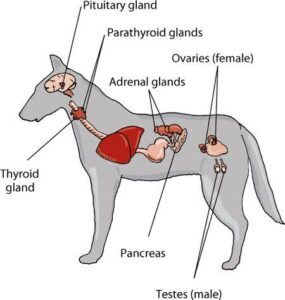Back to: ZOOLOGY 400 Level
Welcome to class!
Hey there, future expert! I’m so glad you’re back and ready to explore another fascinating aspect of how your body works. Today, we’re going to talk about hormonal regulation and endocrine glands, which is all about how your body controls and balances everything, from growth to mood, using a special group of messengers—hormones. Trust me, once you understand this, you’ll start seeing your body as an incredibly well-coordinated system, with hormones acting like tiny but powerful helpers in the background.
Hormonal Regulation And Endocrine Glands
What is Hormonal Regulation?
Hormonal regulation is the process through which your body maintains balance using hormones—chemical messengers that control and coordinate activities in your body. Think of hormones like the “bosses” that give orders to different parts of your body. They travel through your bloodstream, telling your organs and tissues what to do.

For example, if you get scared, your body produces adrenaline (the “fight or flight” hormone) to help you react quickly. If you’re hungry, your body produces another hormone called ghrelin to tell you it’s time to eat. These hormones are like instructions that keep everything running smoothly.
Endocrine Glands
Hormones are produced by special organs called endocrine glands. These glands don’t have ducts (like sweat glands, for instance). Instead, they release hormones directly into the bloodstream, which carries the hormones to where they’re needed in the body.
Here are some of the key endocrine glands and the hormones they produce:
Pituitary Gland: Often called the “master gland”, this small gland at the base of your brain controls other endocrine glands. It produces hormones that affect growth, metabolism, and reproduction. For example, the growth hormone (GH) helps you grow taller and develop muscles.
Thyroid Gland: Located in the neck, the thyroid produces thyroxine, which regulates metabolism—how your body uses energy. If you have too much or too little thyroxine, it can affect your energy levels.
Adrenal Glands: These are located on top of your kidneys. They produce hormones like adrenaline, which helps you respond to stress, and cortisol, which helps manage your metabolism and stress response.
Pancreas: The pancreas produces insulin, which controls your blood sugar levels. If you eat too much sugar, insulin helps bring the levels back down to normal.
Ovaries (in females) and Testes (in males): These glands produce sex hormones like oestrogen (in females) and testosterone (in males), which control sexual development and reproductive functions.
Hormonal Regulation in Action
Hormones are involved in a number of important functions in your body. Let’s take the example of blood sugar regulation:
When you eat, your blood sugar rises.
The pancreas detects this and releases insulin into your bloodstream.
Insulin helps cells absorb the sugar for energy or storage, lowering your blood sugar to a normal level.
If your blood sugar drops too low (for example, if you don’t eat for a while), the pancreas releases glucagon to release stored sugar and raise your blood sugar levels back to normal.
This is just one example of how hormones help maintain balance in the body.

Real-life Example
Imagine you’re getting ready for an important exam. As the time approaches, you begin to feel nervous. This nervousness triggers your adrenal glands to release adrenaline. This hormone gets your heart racing, your body ready to face the challenge, and gives you a burst of energy. That’s hormonal regulation at work, helping you manage stressful situations!
Summary
- Hormonal regulation is the process through which hormones control and coordinate activities in the body.
- Endocrine glands, such as the pituitary, thyroid, adrenal glands, and pancreas, produce hormones.
- These hormones travel through the bloodstream to target organs, regulating functions like metabolism, growth, and reproduction.
- A good example is blood sugar regulation, where insulin and glucagon balance sugar levels in the body.
- Hormones are vital for your body’s daily operations and help maintain internal balance.
Evaluation
- What is the role of hormones in your body?
- Name and describe the function of at least three endocrine glands.
- How does the pancreas help regulate blood sugar levels?
- What is the function of adrenaline, and how does it affect the body?
- Explain how hormonal regulation maintains balance in the body using a specific example.
Well done, superstar! You’ve just unlocked the secret to how your body’s internal systems work together like a finely tuned orchestra. Keep shining, keep learning, and know that Afrilearn is with you every step of the way. You’re capable of anything you set your mind to, and this is just the beginning! 🌟
